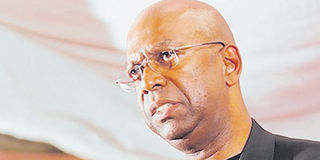Open Government is a catalyst for trust

What you need to know:
- The Concorde represented the belief that there were no barriers to where mankind could go, or how fast we could get there. And yet, when the last Concorde flight landed in 2003, not only did the golden era of supersonic flight end, in many ways, so did that global feeling of optimism and hope.
Despite being billed as a “commercial disaster” when it launched, the Concorde soon became the global symbol of audacity. Born in the late 1960s, it captured a universal spirit of renewed hope following several devastating world wars.
The Concorde represented the belief that there were no barriers to where mankind could go, or how fast we could get there. And yet, when the last Concorde flight landed in 2003, not only did the golden era of supersonic flight end, in many ways, so did that global feeling of optimism and hope.
Quite simply, the public lost trust in the vision that Concorde represented. They became weary of a new global paradigm that was seeing governments and companies getting bigger and more powerful, effectively leaving them behind. Positive growth seemed to only exist for a select few. Today, that crisis of faith continues to affect our most important global institutions.
Even as external factors like climate change disrupt communities and populations grapple with increased unemployment in an automated world, we are shifting our perceptions of the trustworthiness of our governments, leaders, businesses, civil society and economic systems. Already, more than half the world has lost trust in key institutions, with just 37 per cent of CEOs and 29 percent of government officials seen as credible.
Through their day-to-day (and often predatory) actions, these institutions are not inspiring trust. They have become monuments to commercial gain at the expense of social good. And yet, without trust, you can’t strive to create the institutions that have made mankind so enterprising – like the Concorde. So how can we begin to rebuild trust?
Our most urgent consideration lies in the fact that our future will be fundamentally different from our past. If we need to build more symbolic Concordes, then we will need to rethink the way our systems work. We must invest in new and inventive solutions that put the long-term interests of people, the community and the environment first. This means that we must be prepared to do the unusual.
We must think beyond the traditional lines of government and business to meet the true needs of our communities. For instance, we know that a key component of regaining trust is transparency. Using our mobile money product, M-Pesa, we have been able to digitise food delivery for more than 100,000 households in the camps of Daadab and Kakuma. Through a cross-sector partnership, we have ensured refugees living in the camps no longer have to beg for food. Today, they are able to gain access to food tokens, delivered via their mobile phones, that they can spend wherever and whenever they want.
This simple solution has brought about a massive shift from the decades-old indignity of relying on handouts from state and aid agencies. It delivers transparency. It has removed the opportunity for corruption by eliminating middle-men, and reduced the cost of distributing relief aid, while creating employment and business opportunities for people in refugee camps. By upholding openness as one of the key drivers for this solution, we have found relevance at the intersection of need and profitability.
This kind of commercial transparency catalyzes trust, and has created a more engaged community in the camps. This is mainly because technology can often extend trust in ways no other intervention can. Technology is impartial, can cut costs, and deliver solutions faster than traditional means.
We are already seeing that mobile money can limit corruption, which is a significant detractor for investors on the African continent. In Kenya for instance, M-PESA is already helping county governments streamline their revenue collection. Citizens can currently apply and pay for 41 services from various public sector departments, including immigration, civil and business registration, through the eCitizen online platform. In Rwanda, an e-government platform, Irembo, has reduced the time to complete a birth registration from more than six hours to as little as 40 minutes. In Côte d’Ivoire, a public-private collaboration between the Ministry of Education and mobile money has resulted in 99.3 per cent of secondary school fees being digitised. This has decreased the number of lost payments, fraud, and theft drastically, and enabled the Ministry of Education to better manage their annual budgets because mobile money allowed the government to collect fees earlier in the year.
These initiatives are proof that increased transparency and openness can help us to overcome uncertainty across communities, economies, and eventually, the world. New and inventive solutions using technology create the building blocks of authenticity. This helps people to trust that institutions will deliver for them and provides the basis for a global movement towards positive collective action. We will have provided a catalyst for trust.
Bob Collymore is the Chief Executive Officer of Safaricom Limited of Kenya




